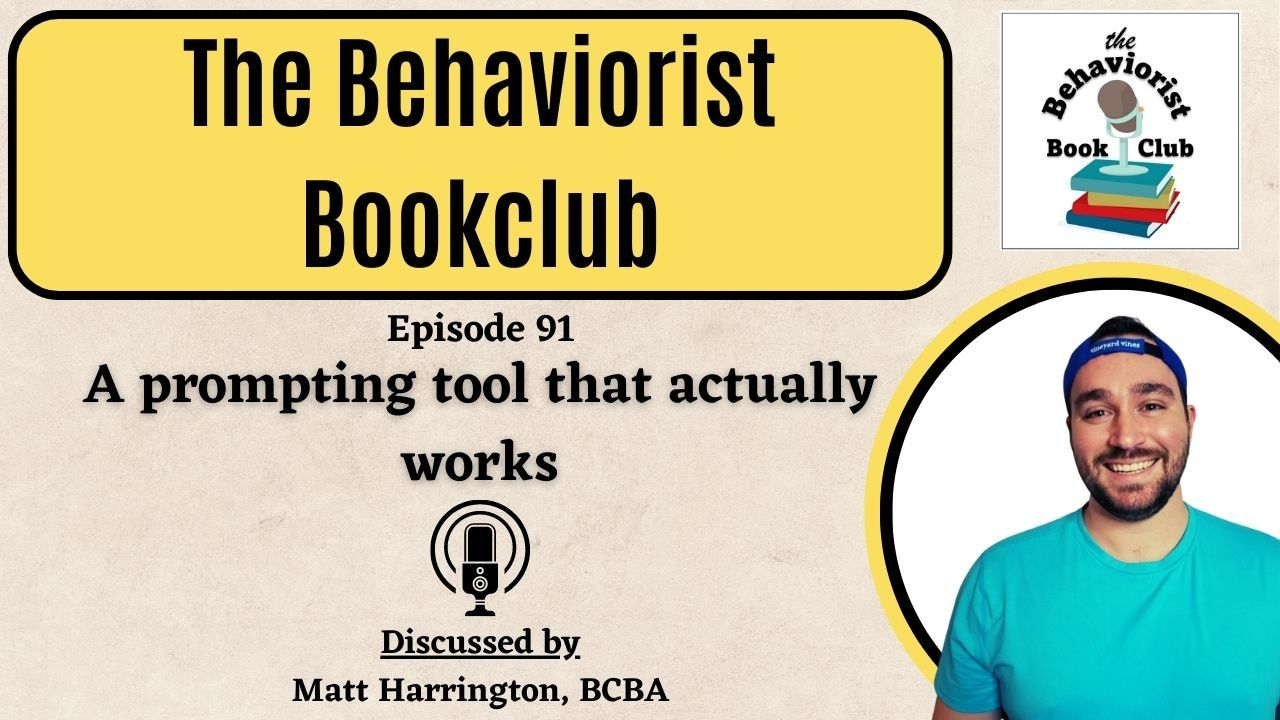Ep. 91- A prompting tool that actually helps
Sep 05, 2023
Resources mentioned in this episode
- 2 CEU course on Solving Clinical Challenges with Research- www.behavioristbookclub.com/solving
- Cowen et al., 2023- https://link.springer.com/article/10.1007/s40617-022-00722-8
Please contact Matt @ [email protected] if you have any questions or if you need help accessing the full article!
Full Transcript (Click for downloadable copy)
The following blog post was written by Chat GPT after providing the full transcript and requesting an accompanying blog post. For more information about why and how I use Chat GPT, please see this accompanying blog post -> Why I use Chat GPT for my Show Notes (behavioristbookclub.com)
The Behaviorist Book Club: Mastering Prompting Strategies for Effective Behavior Change
Introduction:
Welcome to the Behaviorist Book Club, a podcast dedicated to helping practitioners achieve meaningful and socially significant behavior change for their clients. I'm your host, Matt Harrington. In today's episode, we're diving into an article that holds the key to enhancing your behavior analysis practice: Cowen and colleagues' 2023 research on a Decision Making Tree for Evaluating and Selecting Prompting Strategies. Prepare to gain valuable insights into the world of prompting, why it matters, and how it can transform your approach to behavior change.
The Quest for Objectivity in Behavior Analysis:
Have you ever heard the phrase, "shaping is more art than science?" It's a statement that's sparked frustration among behavior analysts like me. Our field is rooted in objectivity, striving to define and individualize the human experience. While there's room for subjectivity, the goal is always to create lasting, accurate definitions. Prompting, a critical teaching tool, often straddles the line between objectivity and subjectivity. We aim to strike a balance, offering the least restrictive prompt while ensuring correct responses.
The Art and Science of Prompting:
Prompts are like guiding lights in behavior analysis. They facilitate learning by providing learners with cues that lead to correct responses. But finding the right prompt strategy can be a complex dance. It involves transitioning from model prompts to verbal prompts to natural cues while avoiding over-prompting and dependency. As behavior analysts, we're constantly evaluating the next prompt, adjusting on the fly, and seeking ways to optimize learning outcomes.
Introducing SWEEPs: A Game-Changing Tool:
Enter SWEEPs: A Systematic Worksheet for the Evaluation of Effective Prompting Strategies. This innovative decision-making tree developed by Cowen and team aims to revolutionize how we select and evaluate prompt strategies. SWEEPs synthesizes years of research into an easy-to-follow tool, helping practitioners make evidence-based decisions with precision and confidence.
Navigating the SWEEPs Decision-Making Tree:
SWEEPs is more than just an acronym; it's a game-changing system. This systematic approach guides behavior analysts through a series of questions to determine the most effective prompt strategy for a given situation. From least-to-most prompting to progressive delay, SWEEPs covers a range of scenarios. The research paper provides supporting information and worksheets to facilitate prompt selection and data collection.
From Research to Practice: Testing SWEEPs' Efficacy:
Cowen and colleagues didn't stop at developing SWEEPs; they put it to the test. They trained graduate students in its use and assessed its impact on prompt selection accuracy. The results were impressive, highlighting the power of behavioral skills training and expert guidance. However, a key challenge emerged: maintaining consistent use of SWEEPs in real-world practice.
The Challenge of Behavior Change:
The heart of the matter lies in convincing behavior analysts that prompting is a challenge worth addressing. Many believe their existing strategies are effective, leading them to overlook the potential benefits of tools like SWEEPs. The real question is: could your teaching be even more efficient? Could you achieve better results with less effort? These are critical considerations for practitioners seeking to maximize their impact.
Conclusion: A Path Forward for Better Behavior Change:
In a field that values objectivity and evidence-based practice, SWEEPs offers a groundbreaking solution. It's time to acknowledge that prompt selection is not just an art; it's a science that deserves careful consideration. While SWEEPs may not be a daily tool for every behavior analyst, it serves as a valuable checkpoint and a reminder that even experienced practitioners can benefit from systematic evaluation. The Behaviorist Book Club invites you to explore SWEEPs and challenge the status quo, as we strive to elevate behavior analysis to new heights of effectiveness.
Thank you for joining us on this journey of discovery. As we reflect on the power of SWEEPs, remember that progress is built on a foundation of research, collaboration, and a commitment to continuous improvement. Stay tuned for more thought-provoking episodes and empowering insights from the Behaviorist Book Club.
Solve your clinical challenges with research using this simple, 3 step process that saves you time and gets you clinical answers FAST.
Learn the Key Places Framework, the Research Finding Framework, and how they work together in this free minicourse.
Signing up will also subscribe you to the email list. Unsubscribe at anytime! We will never sell your information, for any reason.

